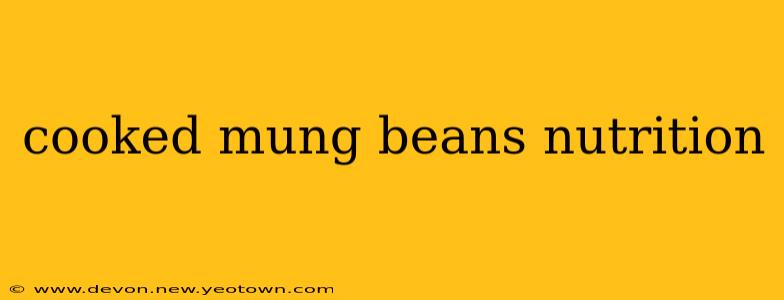Mung beans, those small, green gems, are more than just a humble legume. Packed with nutrients and boasting a subtly sweet flavor, cooked mung beans are a versatile and incredibly healthy addition to any diet. From ancient Asian cuisine to modern health-conscious kitchens, these beans have earned their place as a nutritional superstar. Let's dive into the world of cooked mung beans and uncover their impressive nutritional profile.
What are the health benefits of cooked mung beans?
The health benefits of cooked mung beans are numerous, stemming from their rich composition of vitamins, minerals, and fiber. They're a fantastic source of plant-based protein, crucial for building and repairing tissues, and are especially beneficial for vegetarians and vegans seeking complete protein sources. Their high fiber content aids digestion, promotes regularity, and can even help lower cholesterol levels. Beyond that, mung beans contribute to overall well-being by supporting a healthy immune system and potentially reducing the risk of certain chronic diseases.
What are the nutritional values of cooked mung beans?
A single cup of cooked mung beans (approximately 150 grams) offers a treasure trove of nutrients. You'll find a significant amount of protein, contributing to satiety and muscle health. They're also an excellent source of folate, crucial for cell growth and development, especially during pregnancy. Iron content is noteworthy, supporting healthy blood production. Further bolstering their nutritional profile are essential minerals like potassium, magnesium, and manganese, vital for various bodily functions. The fiber content significantly aids digestive health and promotes a feeling of fullness, making them a helpful addition to weight management plans.
Are cooked mung beans good for weight loss?
Yes, cooked mung beans can be a valuable asset in a weight loss journey. Their high fiber content promotes satiety, meaning you feel fuller for longer, reducing overall calorie intake. The protein content further supports this effect, helping to regulate blood sugar levels and preventing those energy crashes that often lead to unhealthy snacking. However, it's important to remember that weight loss is a holistic process that involves a balanced diet and regular exercise. While mung beans can be a helpful component, they're not a magic bullet.
How many calories are in cooked mung beans?
Approximately 1 cup of cooked mung beans contains around 230 calories. However, the exact calorie count can vary slightly depending on preparation methods and additions. Compared to many other high-calorie foods, mung beans are relatively low in calories, making them a wise choice for those watching their intake.
What are some ways to prepare cooked mung beans?
The beauty of mung beans lies in their versatility. They can be enjoyed as a simple side dish, cooked and seasoned with just a touch of salt and pepper. They're equally delightful added to soups, stews, and salads. More adventurous cooks may incorporate them into curries, veggie burgers, or even sprout them for a unique and nutritious addition to sandwiches and bowls.
Are there any side effects of eating cooked mung beans?
While generally safe and highly beneficial, excessive consumption of mung beans can lead to some digestive discomfort in sensitive individuals. This may manifest as bloating, gas, or diarrhea. Starting with smaller portions and gradually increasing intake can help minimize these effects. Also, be aware that mung beans contain antinutrients, which can interfere with mineral absorption. Soaking and cooking the beans thoroughly helps to reduce the antinutrient content.
In conclusion, cooked mung beans offer a remarkable blend of nutritional benefits and culinary versatility. From supporting weight management to boosting overall health, these unassuming legumes deserve a prominent spot in your diet. Remember to consult with a healthcare professional or registered dietitian for personalized dietary advice.

